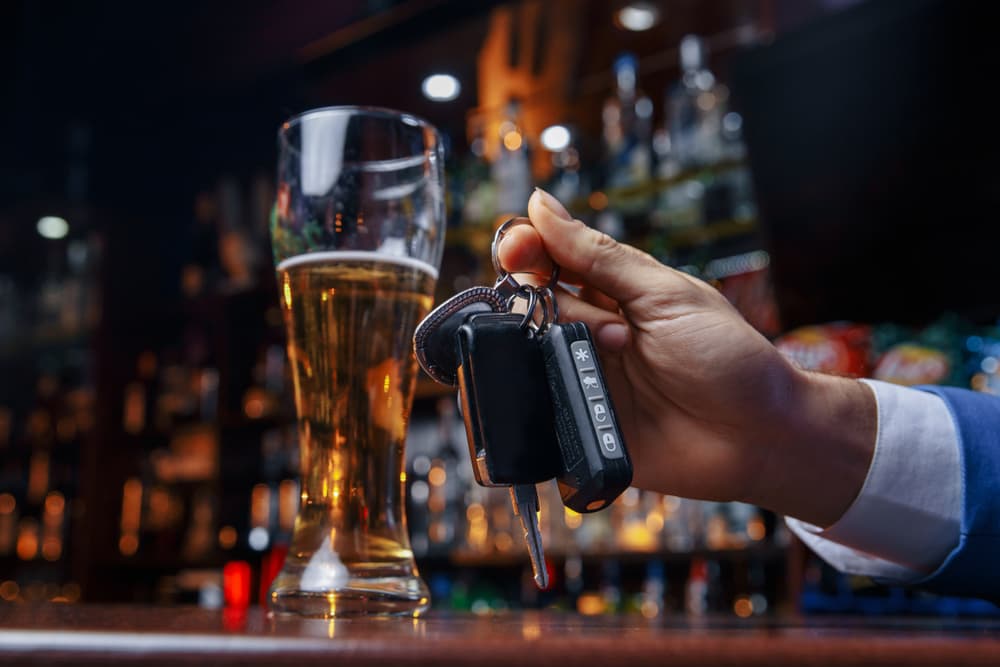A criminal conviction for driving under the influence of alcohol or drugs – or DUI – can come with serious penalties and collateral consequences. The legal penalties upon conviction may include fines, probation, community service, and even jail time. Additionally, individuals may be faced with various administrative penalties, including loss of their driver’s license and collateral consequences.
In most cases, a DUI arrest or conviction will not appear directly on an individual’s passport. However, certain countries may have restrictions against issuing visas to individuals with a DUI conviction on their record.
If you are currently facing a DUI charge, a knowledgeable DUI defense attorney in your area can determine your legal options and let you know about the potential penalties (and collateral consequences) upon conviction. Your attorney will then do everything they can to help you achieve the best possible result in your DUI case.
What Does the Government Need to Prove to Secure a DUI Conviction?
To secure a DUI conviction, the state prosecutor must prove several key elements beyond a reasonable doubt. These elements form the foundation of the case and are essential for establishing guilt:
- First, the prosecutor needs to demonstrate that the accused individual (or defendant) was operating a motor vehicle. This element typically involves showing that the defendant was driving or in control of a vehicle while under the influence of alcohol or drugs. Evidence may include eyewitness testimony, police observations, or surveillance footage.
- Secondly, the prosecutor must establish that the defendant was under the influence of alcohol or drugs at the time of driving. This is often proven through chemical tests such as breathalyzers, blood tests, or urine tests. These tests measure the level of alcohol or drugs in the defendant’s system, providing objective evidence of impairment.
- Additionally, the prosecutor needs to show that the defendant’s impairment affected their ability to operate the vehicle safely. This element focuses on the defendant’s behavior and driving patterns, including any erratic movements, traffic violations, or accidents that occurred while driving under the influence.
- Furthermore, the prosecutor must demonstrate that the defendant was driving on a public road or highway. This element establishes jurisdiction and ensures that the offense occurred within the state’s legal jurisdiction.
- Moreover, in some jurisdictions, the prosecutor may need to prove that the defendant had a blood alcohol concentration (BAC) that was at or above the legal limit. Each state sets its own legal limit for BAC, typically around 0.08 percent.
In addition to these elements, the prosecutor may also need to establish other factors, depending upon the specific case circumstances. These may include prior DUI convictions, refusal to submit to chemical testing or aggravating factors such as speeding or reckless driving.
What are the Possible Legal Penalties for a DUI Conviction?

When someone is convicted of a DUI, they can face various legal penalties that aim to discourage impaired driving and ensure public safety. Here’s a breakdown of the possible consequences:
- Monetary Fines – DUI convictions often come with hefty fines, which can vary depending upon factors like the severity of the offense and the individual’s prior record. These fines serve as a financial penalty for breaking the law.
- Jail Time – In more serious cases, DUI convictions can lead to imprisonment. The duration of jail time depends upon the circumstances of the offense, such as whether there were any accidents or injuries involved.
- Probation – Instead of or in addition to jail time, offenders may be placed on probation. During probation, individuals must follow specific conditions set by the court, like attending alcohol education classes or regularly meeting with a probation officer.
- Community Service – Courts may also require DUI offenders to perform a certain number of hours of community service. This serves as a way for offenders to give back to the community and make amends for their actions.
- Drug and Alcohol Rehabilitation – DUI offenders may be ordered to undergo drug and alcohol rehabilitation programs. These programs aim to address any underlying substance abuse issues and reduce the risk of future offenses.
- Ignition Interlock Device Installation – Some jurisdictions require DUI offenders to install ignition interlock devices (IIDs) in their vehicles. These devices require the driver to pass a breathalyzer test before starting the car, preventing them from driving if they’re intoxicated.
- License Suspension or Revocation – A common penalty for DUI convictions is the suspension or revocation of the offender’s driver’s license. This can range from a temporary suspension to a complete revocation, depending on the severity of the offense and any prior DUI convictions.
- Mandatory DUI Education or Treatment Programs – Courts may also mandate DUI offenders to attend educational or treatment programs. These programs aim to increase awareness about the dangers of impaired driving and help individuals make better choices in the future.
If you ultimately incur a DUI conviction, your criminal defense lawyer can represent you during your sentencing hearing and pursue the lightest possible penalty on your behalf.
Will a DUI Arrest or Conviction Appear on a Passport?
A DUI conviction typically does not show up on a passport itself. Passports primarily contain information such as the holder’s name, date of birth, photograph, and passport number, which are used for identification and travel purposes. However, certain countries may require travelers to disclose criminal convictions, including DUIs, when applying for a visa or entry into the country.
The potential consequences of having a DUI conviction when traveling abroad can vary depending on the destination country’s laws and policies. Here are some possible implications:
- Entry Restrictions – Some countries have strict entry requirements for individuals with criminal records, including DUI convictions. Travelers with DUIs may be denied entry or face additional scrutiny at border checkpoints.
- Visa Denial – Certain countries may deny visas to individuals with DUI convictions, particularly if the offense is recent or considered severe. Applicants may be required to disclose their criminal history during the visa application process, and a DUI can result in visa denial.
- Background Checks – In some cases, foreign authorities or immigration officials may conduct background checks on travelers entering their country. A DUI conviction may be discovered during these checks and affect the traveler’s ability to enter or remain in the country.
- Travel Restrictions – Even if allowed entry, individuals with DUI convictions may face travel restrictions within certain countries. For example, they may be prohibited from renting a car or driving while under the influence of alcohol or drugs.
- Legal Consequences – If a traveler with a DUI conviction violates the laws of the destination country, they may face legal consequences, including fines, deportation, or even imprisonment. It’s essential for travelers to familiarize themselves with the local laws and regulations to avoid any legal issues.
To lessen the potential consequences of a DUI conviction when traveling abroad, individuals should consider the following steps:
- Research the entry requirements and visa policies of the destination country.
- Disclose any criminal convictions, including DUIs, when required during the visa application process or at border checkpoints.
- Abide by the laws and regulations of the destination country, including those related to alcohol consumption and driving.
- Seek legal advice or assistance if unsure about how a DUI conviction may affect travel plans.
If you ultimately incur a DUI charge or conviction, an experienced criminal defense attorney can explain the potential travel consequences and help you take the appropriate steps.
Defending against a DUI Charge
Obviously, the best way to prevent travel consequences (and other possible penalties) associated with a DUI is to avoid a conviction in the first place. Defending against a DUI charge can be daunting, but understanding your rights and available defenses can make a significant difference in the outcome of your case. When facing a DUI charge, it’s crucial to seek legal counsel immediately to explore all possible defense strategies.
- One potential defense is challenging the legality of the traffic stop. Law enforcement must have a valid reason to pull you over, such as a traffic violation or reasonable suspicion of DUI. If the stop was unlawful, any evidence obtained afterward, such as field sobriety tests or breathalyzer results, may be deemed inadmissible in court.
- Another possible defense strategy is questioning the accuracy of chemical tests. In particular, breathalyzer machines can produce false readings due to various factors, including improper calibration or user error. An experienced attorney can challenge the reliability of these tests and call into question their validity as evidence.
- Additionally, disputing the officer’s observations and conduct during the stop can be an effective defense. For instance, if the officer failed to properly administer field sobriety tests or did not follow proper procedures, it may cast doubt on the validity of their testimony.
- Furthermore, medical conditions or other factors unrelated to alcohol consumption may have influenced your behavior or performance on sobriety tests. These factors can be presented as mitigating circumstances to explain any perceived impairment.
- It’s also possible to challenge the chain of custody of blood or urine samples if they were mishandled or improperly stored, potentially compromising their usefulness as evidence.
- Furthermore, plea bargaining may be an option, where the defendant agrees to plead guilty to a lesser charge in exchange for a reduced sentence. This approach can be beneficial in cases where the evidence against the defendant is strong, but it’s essential to weigh the pros and cons carefully with the guidance of legal counsel.
By exploring all available legal defenses and working with an experienced criminal defense attorney, individuals accused of DUI can improve their chances of achieving a favorable outcome in their case.
Ways of Resolving a DUI Case

Resolving a DUI case involves careful consideration of whether to take the matter to trial or pursue a plea deal with the state prosecutor. Both options have pros and cons, and the decision ultimately depends upon the specific circumstances of the case – and the defendant’s goals.
Taking the case to trial means presenting evidence and arguments in court to challenge the prosecution’s case. This option allows the defendant to exercise their constitutional right to a fair trial and potentially avoid a conviction if the evidence is not sufficient to prove guilt beyond a reasonable doubt. However, going to trial can be time-consuming, stressful, and costly, as it involves legal fees and court expenses. Additionally, there is always the risk of being found guilty and facing harsher penalties than those offered in a plea deal.
On the other hand, pursuing a plea deal involves negotiating with the state prosecutor to plead guilty to a lesser charge or receive a reduced sentence in exchange for avoiding a trial. This option can result in a quicker resolution to the case and may lead to more lenient consequences than those imposed after a trial and conviction. Plea deals can also spare defendants the uncertainty and emotional toll of going through a trial. However, accepting a plea deal means waiving the right to a trial and admitting guilt to some extent, which can have long-term consequences. Those consequences may include a criminal record and limitations on future opportunities.
When deciding whether to take a DUI case to trial or pursue a plea deal, individuals should carefully weigh the potential pros and cons of each option with the guidance of their criminal defense attorney. Factors to consider include the strength of the evidence against them, their likelihood of success at trial, the potential consequences of a conviction, and personal preferences.
Whichever option you decide on, an experienced criminal defense lawyer will be by your side, aggressively fighting for your legal interests.
Contact an Experienced DUI Defense Attorney Today about Your Options
DUI convictions and penalties are extremely serious. In some cases, a DUI conviction on your record may even limit your ability to travel internationally. A knowledgeable criminal defense attorney in your area will do everything possible to obtain a complete dismissal of your charge by raising a strong defense on your behalf. However, if that is not possible, your attorney can pursue a favorable plea deal from the state prosecutor and work to lessen (or eliminate) the penalties and collateral consequences you face.


